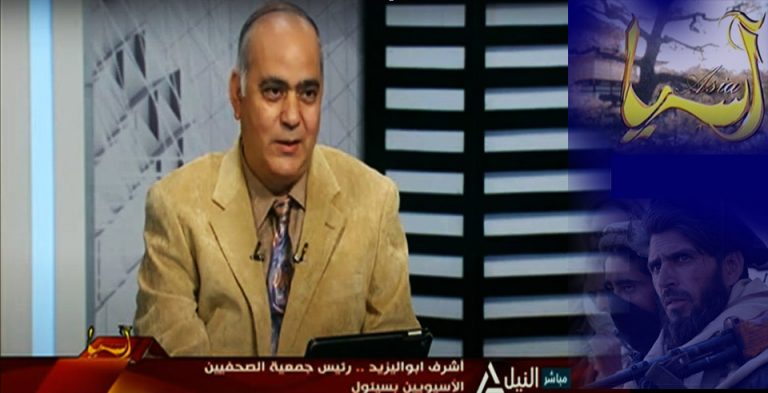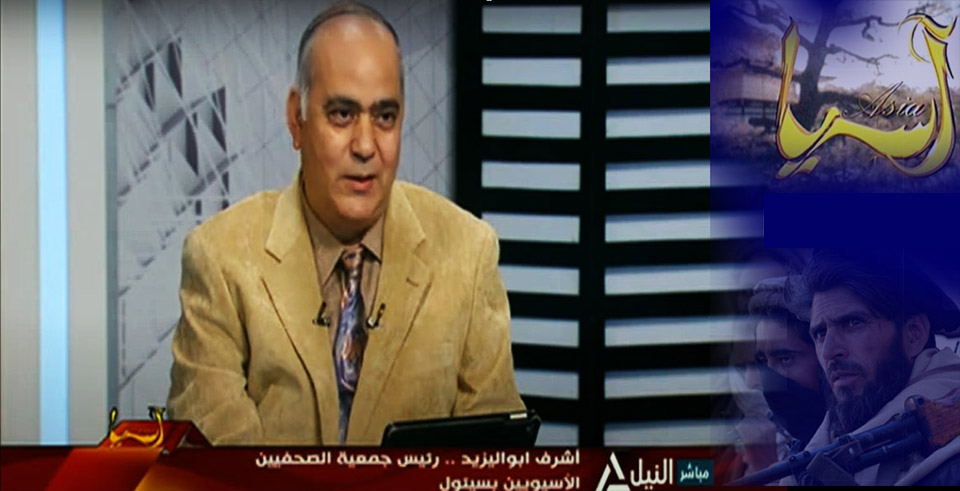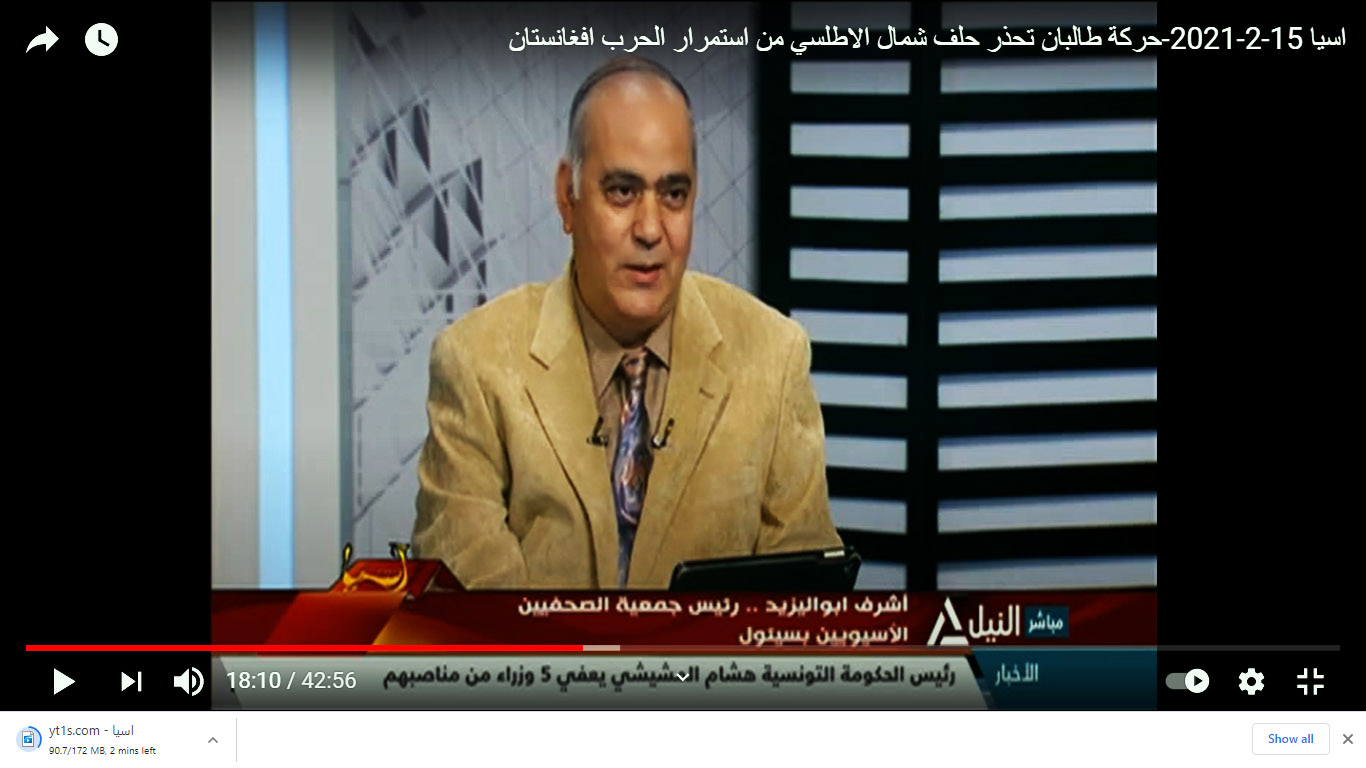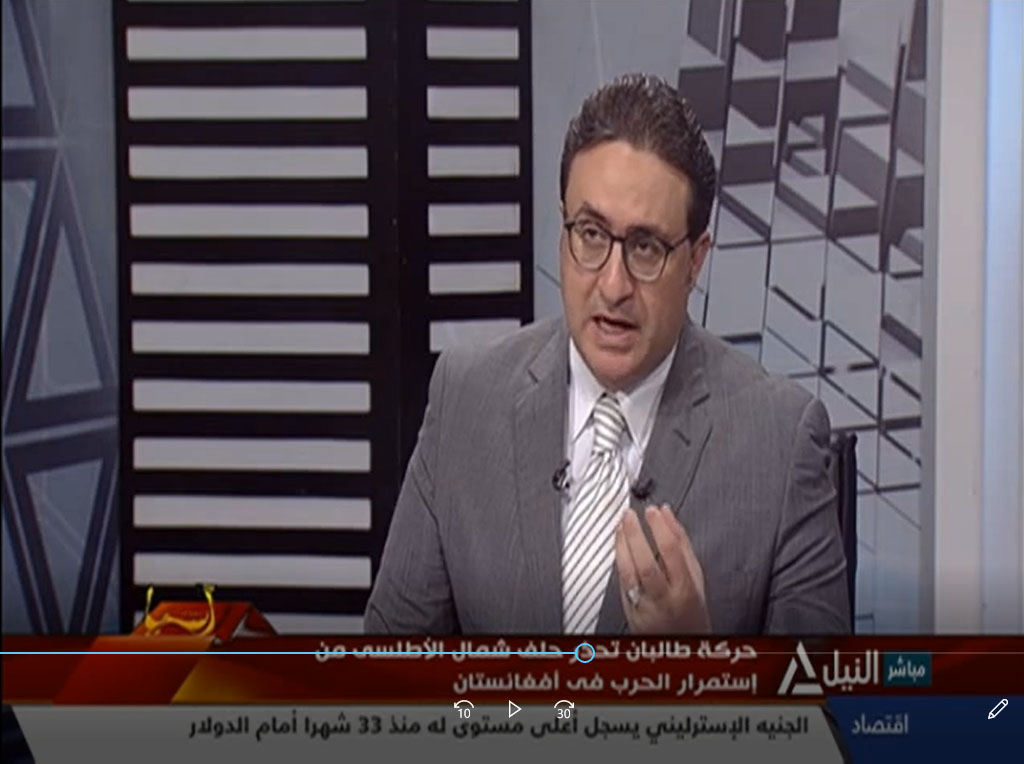
 The United States does not want to leave Afghanistan, as it is connected to a vital region – Central Asia, China, Iran, Arabian Gulf and to Pakistan. America does not want to get out of. America wants to stay with the least losses.
The United States does not want to leave Afghanistan, as it is connected to a vital region – Central Asia, China, Iran, Arabian Gulf and to Pakistan. America does not want to get out of. America wants to stay with the least losses.
The Taliban want to return today’s Afghanistan to the fifth century AD, to revive that kingdom, or empire, or name, and to be under the flag that they raise, and the rules they advocate.
Egypt’s Scholar Ashraf Aboul-Yazid speaks on Taliban, NATO and Afghanistan
On the so-called Taliban’s warning to NATO against the continuation of the war in Afghanistan, an episode of Egypt’s Asia TV program was live on Monday, February 15, 2021, which hosted the Egyptian writer Ashraf Aboul-Yazid, President of the Asia Journalist Association. The program was presented by Tamer Hanafi, prepared by the editor, Intisar Al-Dardiri.
Interviewer: To this extent, the Taliban file will not be processed?!
Ashraf Aboul-Yazid:
I am pessimistic. If I say there is a solution, I think I am far from the right thing; why, because the cycle of this threat is repeated, and it comes whenever it seems that there is a solution, or if we have a secure future or that there is a renewal of the presence of the governmental authority in Afghanistan. It happened in 2007, it happened again in 2014, and it is happening now, even after the conclusion of the agreement that was in Doha last year
Interviewer: You say when a solution comes, obstacles appear. Does that mean that in that in the European or American formation, there is someone whose goals are in conflict with others?
Ashraf Aboul-Yazid:
This issue appeared at the very beginning, you know that the goal – after September 11, 2001, and the entrance of the United States into Afghanistan – was to punish who did the terrorist attacks then, and the goal that convinced the allies at the time was to make Afghanistan not a haven for terrorists to threaten the world again.
If you compare the participation of fifty countries, including NATO members of course, and the partners or collaborators with them, who allied with them from outside the alliance, they were sending more than 130 thousand soldiers, during this period, these numbers decreased, and the number of participants in the alliance decreased, and the reason was that Many questions began within the alliance, among the senior members of the alliance:
For example, when Germany entered, it wanted to participate in the United States, to express its support for the United States, as a kind of giving confidence, and they also said that we will support the views of the United States in this regard.
The condition of presence of these forces, that they do not start striking with fire, that is, they could fire in defense of themselves, so there is a limited participation of German forces, in addition to the German forces, perhaps Germany insisted, wanted, or chose to stay in the north, and the north is less dangerous than the south, so the countries in the south ask their citizens about (when will we go out?)
In Germany, 2007, 57% of the German public wanted to get out of Afghanistan immediately, but this number increased after seven years to be 70%, even though they are the least vulnerable.
But the general aspect is that the Taliban whenever a kind of relative peace occurs, a kind of hostility and a kind of terrorist operations began, as I said, even if they were only in the south.
Interviewer: Where is the disagreement here regarding the views of the strategies for each country? We are talking as you said, and as you indicated at the beginning of your speech, that whenever a solution appears on the horizon, matters get complicated. Why is that?
Ashraf Aboul-Yazid:
The reason is that the strategy has changed, from that we want to eliminate the Taliban with conventional war, to that we want to develop the country, secure it, and develop its capabilities to defend itself, which is the strategy of NATO. It wanted to develop from being a battlefield to a building and reconstruction arena. There were about 28 teams to rebuild the country.
Interviewer: Do you think that is a change in strategy, or a desire to stay in different forms?
Ashraf Aboul-Yazid:
The desire to stay began at the very first day. Because after NATO established the UN-mandated International Security Assistance Force (ISAF), there was a NATO representative with the government, meaning that he coordinated what was done every day.
But these reconstruction operations required many needs that were not met by the allies. And they – perhaps – found it easier to hit with the bombs from the sky than to build on ground. And the existence of some kind of alliance between Al Qaeda in the south and the Taliban confirmed that this reconstruction is not possible. And that survival for the sake of reconstruction only is not possible.
Therefore, the Taliban’s terrorist operations intensified, and there were reactions from the alliance, on the ground, which made the reconstruction policy not only the one that was certain. Rather, there must be cohesion and fighting with the Taliban.
Interviewer: Despite the signing of the peace agreement, where do you see the American orientation towards Afghanistan?
Ashraf Aboul-Yazid:
The review of the agreement is part of the reviews of everything that came in the Trump era, meaning that the US President is not only reviewing the peace agreement with the Taliban and what happened in Afghanistan, but the American presence in other places, immigration laws, etc.
These are part of a general review, but it appears that the presence of only 2,500 US troops in Afghanistan may be more vulnerable than the presence of larger forces; because when the number decreases in light of the escalating attack on civilians, and other terrorist operations, this also means that you are putting this small force at risk.
I mean, we in Asia Journalist Association have noticed, for example, the escalation of Taliban, murders of media persons, on a regular basis, a journalist who returns home was stopped on road and got killed. In just two months, there were five media fatalities.
Interviewer: And did you find an explanation in Asia Journalist Association?
Ashraf Aboul-Yazid:
We found that they do not want a different voice. These (murdered) say positively that there is a peaceful solution, that there is a civil society, that there is a reconstruction, while Taliban does not want this shining face, nor this positive voice, or the voice of the government, because you cannot now separate the government from peaceful opinion or public opinion calling for peace. The public opinion that the Alliance wants to achieve through its existence
 Interviewer: And why if the alliance wanted that, why did he set aside the government of Ashraf Ghani from its presence in this agreement, and excluded only his meeting with the Taliban? As if they were the ones ruling, or as if they were paving the way – the United States and the Taliban – for a post-agreement phase of government.
Interviewer: And why if the alliance wanted that, why did he set aside the government of Ashraf Ghani from its presence in this agreement, and excluded only his meeting with the Taliban? As if they were the ones ruling, or as if they were paving the way – the United States and the Taliban – for a post-agreement phase of government.
Ashraf Aboul-Yazid: I think that (President) Ashraf Ghani, who is (an academic) originally, specialized in religious affairs, was a President of Kabul University, and studied in the United States of America. I think he was the most appropriate to achieve something for his country, and during the Soviet era he was not present in the country, he went to Lebanon to study, married a Lebanese woman, traveled to America and took a doctorate, and returned to elections as parliament member and president of a university with a project for the poor, before being elected president in 2014. He is a model and ideal person in his vision of the country and the development of the country, so his exclusion was really unjustified.
Interviewer: My question regarding the next, Mr. Ashraf, does the Joe Biden administration have the ability to change course or reach an opinion contrary to what the United States administration signed under Donald Trump?
Ashraf Aboul-Yazid:
I mean, issuing a decision is an easy matter, but implementation in reality is very difficult. When we look at the German side, as explained by Dr. Abdul Masih Al-Shami from Berlin via the telephone call, there are other parties and other partners.
For example, the United Kingdom considers that corruption is more evil and harmful than the terrorism carried out by the Taliban, on the stability of the Afghani affairs. Imagine you are building a pyramid, but it is a wooden pyramid that weevils eat.
Interviewer: Who do you mean to run the country’s affairs?
Ashraf Aboul-Yazid:
Yes, the Afghan government receives a lot of criticism, and it says that what undermine the work of the alliance in Afghanistan is not only the Taliban attacks, but rather the administration itself, which has been greatly marred by corruption, and this corruption has helped the influence and interference of Al Qaeda and its agents in Afghan affairs.
Interviewer: Your opinion and some analysts’ continued to use the term al-Qaeda, and linking it to the Taliban, putting the Taliban in a special angle of mind.
If al-Qaeda is linked to the Taliban, what made the United States sit with it, and what did the United States want from this agreement, and all these questions, the most important: What does the Taliban have from a pressure card on the United States?
Ashraf Aboul-Yazid:
You are looking at the hand of Al Qaeda, in one form or another, which is the Taliban, and the Taliban that originated in Afghanistan, which arose in response to a long war that lasted two decades. So, these fighters want to impose their opinion by force.
Meaning that when you look at the history of Afghanistan, it was the country of the Aryana civilization a thousand years B. C. , until the fifth century AD, then it became (in the era of Islam) Khorasan, and then it became Afghanistan, in the nineteenth century.
The Taliban want to return today’s Afghanistan to the fifth century AD, to revive that kingdom, or empire, or name, and to be under the flag that they raise, and the rules they advocate.
So you are in front of – even the strength of Afghanistan – you find the Hazaras, the Tajiks and the Pashtuns, and you also find those coming from Pakistan who are the Baloch. The tribal strength in which Afghanistan is formed allows the Taliban to have the ability to change and impose matters.
I mean, you are asking here about a cultural component of this country, and this cultural component is captured by the Taliban, and I believe that its control is not without religious matters, which the current President of Afghanistan has specialized and studied.
Interviewer: Does that mean that the matter will not be resolved? What did the United States want?
Ashraf Aboul-Yazid:
It will not be resolved. The United States wanted to wipe out the Taliban and impose a Western model inside the country.
Interviewer: You mean to re-contain the Taliban?
Ashraf Aboul-Yazid:
Of course, even the only criticism made by former President Hamid Karzai, when he said in 2014 that the well-known American Bagram base, graduated terrorists, as they arrest civilians and imprison them in Bagram, then they are brought out as terrorists who hate the state.
This criticism made Karzai fail in the elections and Ashraf Ghani Ahmad Zai succeeds. They only want an ally, and he is the one who brought up the current ally with them, with the strength they want, and I believe that they have failed in many places, and failure exists if the alliance’s desires to erase what could be an Afghan identity, as the Afghan identity is emerging from Afghanistan, and it is not necessarily the identity of the Taliban, It is a local identity.
Interviewer: To what degree can you confirm that the United States wants the situation to remain as it is?
Ashraf Aboul-Yazid:
The United States does not want, just as the former colonial powers do not want to leave that region, because it is a region that civilizations have passed through.
Even Alexander the Great went to Afghanistan during his conquests, and reached Balkh, from which Rumi left, so you are in front of a vital region, in Central Asia, its hands are connected from China to Iran, to the Arabian Gulf, and to Pakistan, this center America does not want to get out of. America wants to stay with the least losses.
Interviewer: Is this center adaptable?
Ashraf Aboul-Yazid:
Not in this way, and there is an ongoing war, even if it is hidden.
 Interviewer: Why did the West follow the troop reduction mechanism?
Interviewer: Why did the West follow the troop reduction mechanism?
Ashraf Aboul-Yazid:
To reduce the losses
Interviewer: But reducing the forces increases the losses!
Ashraf Aboul-Yazid:
This question is directed at the leaders. You had twenty years to change the infrastructure, you could not eliminate corruption, and you could not end the reconstruction. You could not make peace with the Taliban.
Interviewer: But the Western forces did not enter for this purpose.
Ashraf Aboul-Yazid: It transformed the goal, and in order to satisfy the allies in NATO, it changed that goal, in order for it to develop and survive, and this did not happen.
_________________________
Click here for watching the interview on Asia TV